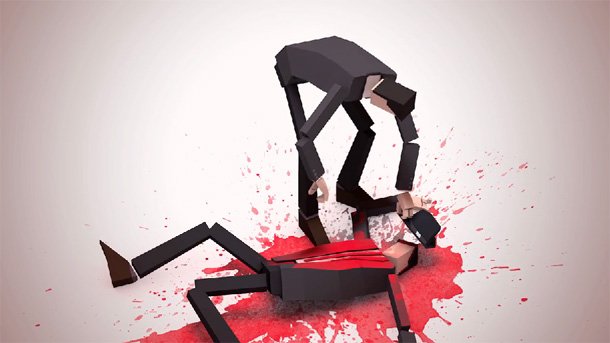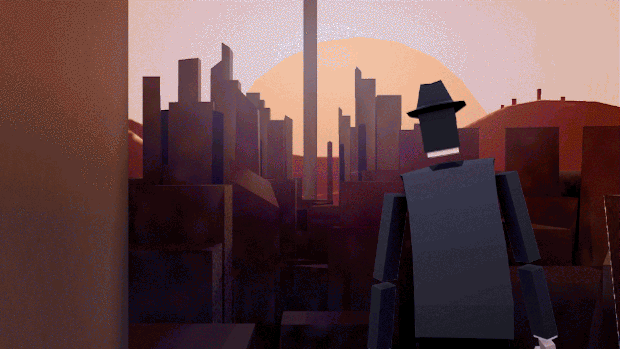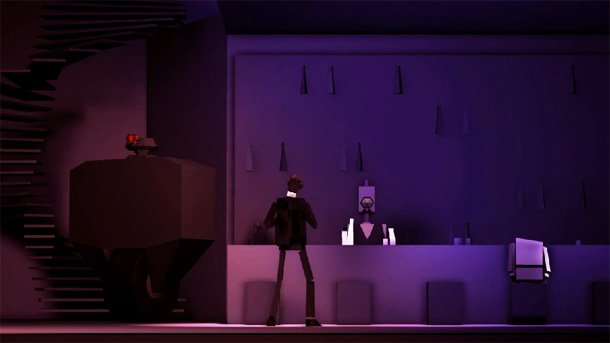Last Life interview: Sam Farmer on the intersection of Total Recall, film noir, and point-and-click adventure

I love film noir and adventure games, so Sam Farmer's Last Life , currently in its final hours on Kickstarter , seems like a game made for me. When I talked to Farmer, though, I was surprised that our conversation veered away from fedoras and shadowy bars and more towards Last Life's sci-fi core. The game is set on Mars, which is weird, and it's about transhumanism—how society changes when 3D printing can indefinitely extend life and AI becomes as intelligent as humanity—which is even weirder. The strangest fact I picked up about Last Life, though, is that Farmer's making the game with his parents.
Wes Fenlon, PC Gamer: Who does the voice of the main character? It's the perfect noir voice.
Sam Farmer: My high school drama teacher. He's great. I use him in all my stuff. He's like a should-be-famous actor.
PCG: Right now we're looking at the gameplay demo you posted in a Kickstarter update. What can you tell me about it?
SF: In this scene you've been printed back to life, you've spent almost all of your time looking for your killer. You've got about 10 minutes left, and you're trying to find this woman named Misty who can extend your life.
PCG: What's going to happen when the 10 minutes is up? Does your body physically fall apart?
SF : Yeah. When you get murdered, normally it's very expensive to get the life insurance you need to get 3D printed back. But once a year they have this celebration called the Dead Man's Party, where they bring back everyone that's died in the last year for a 4 hour party, during which the life insurance companies try to upsell you on their life extension policies. So you break out of the party and go looking for your killer.
The biggest gaming news, reviews and hardware deals
Keep up to date with the most important stories and the best deals, as picked by the PC Gamer team.
How did you come up with this frankly bizarre combination of Mars and film noir?
SF: You know, you're the first person to call it out as being bizarre. You're so right. It's absurd, which is kind of the point.
Part of my thought is that at a certain point, transhumanism is about humans transcending their mortality or their limitations. It's usually got to do with AI, or the singularity, where artificial intelligence gets to be as intelligent as humans and stuff like that. Very hard sci-fi future stuff.
Starting with that, it's like, how do you even cope in a world like that? What things do you maintain that are human that we can relate to, and what are the things that are bizarre and Lynchian and don't even make sense to comprehend anymore? That's kind of an abstract way of answering your question.
The reason it's on Mars is because Earth is destroyed, most of humanity's wiped out. The only remaining civilization is colonies on Mars and Jupiter and around the solar system. Humans haven't really reached beyond that. You're on Mars because of some backstory. But when the Earth gets destroyed, now you're kind of stuck here. You've been a PI your whole life. But it's only about 10 years later that you get this case that leads you to your death.
PCG: So you don't have your memories of why you died, which is what propels the story forward?
SF: Right. But you know the people you used to know. You have your long term memory of like--when you meet people, you know who they are, they know who you are. You just can't remember the last month of your life, really. So that's what a lot of the game is about. Investigating. And that's a rabbit hole that goes very dark, like Chinatown.
PCG: Was there any Total Recall influence banging around in your head when you were making this?
SF: Oh yeah.
PCG: Thinking about it, sci-fi and film noir are pretty common, obviously Blade Runner, but it's the Mars thing that makes it interesting to me.
SF: The Mars thing is kind of weird, to be honest. But I really felt strongly about setting it in a relatable universe. I feel like a lot of sci-fi is really just fantasy with a future skin. What makes something sci-fi is you're basically predicting the future. You're taking what we now have and introducing one thing, or a couple of technologies, that radically alters society.
PCG: What was your inspiration to do a point-and-click adventure game?
SF: I was really inspired by Kentucky Route Zero . I wanted a game that was really about the story and the world. I felt like the best way to explore that, and make that the mechanic, was to make a game that was all about exploring characters.

PCG: That's a pretty recent inspiration. Did you grow up playing LucasArts games, stuff like that?
SF: Yeah! I love those games. But for me, Kentucky Route Zero showed me that there was a mature way to approach that genre that I hadn't even thought about or considered. The Walking Dead similarly, right.
PCG: When you look at Walking Dead, they're really getting away from the point-and-click adventure roots, which I think is a good thing for that game, because it's more about interacting with the characters. Every time you end up running into a point-and-click puzzle, they don't work that well in that setting. What's your approach to having point-and-click staples like puzzles and items you carry around and use in specific situations?
SF: Well, I love puzzle games. But this is super not [about puzzles]. It's really about the story. This is like a game design theory thing that I'm kind of into, but you know about ludonarrative dissonance ? I hate that. I hate it so much.
In all the games I make I strive to really make them cohere. For this, I came up with the world first. So were I to slap a game design or game mechanic on top of that that was like a platformer or even a top-down exploration type game, I didn't feel like it was going to do that world justice. Adventure games are perfect for exploring characters. And to use characters to explore a world. For me, this was just a natural fit.
This puzzle [in the demo] is like me testing how puzzles feel in my game. Previously I was thinking very light on puzzles in general, just making it a really tight hour-long experience. Because it's episodic, each episode is about an hour. But I think situational puzzles like this make sense and keep you engaged. I'm willing to use all the tools in the tool bag, but I want to make sure the player's experience is right at the center of it.
PCG: You can have very obvious puzzle experiences, but what about investigating this mystery as a private eye? Is there a gameplay element of being a private eye?
SF: For sure. In the trailer you get to your own crime scene. That is...the investigation elements i"m taking inspiration from Sherlock, the TV series. The HUD comes up, you've got, like, hypersense ability to put clues together—
PCG: Like Detective Vision?
SF: Yeah, detective—well, look...
PCG: I guess that's the Batman phrase. [laughs]
SF: Yeah, I'm not going to call it detective vision. It's not going to be like a switch that you press. All of the puzzles, and really a lot of the mechanics of the game are based on each scene. So it's a lot of bespoke content. It's a lot of really custom crafted stuff. So I think that's going to serve the story better than having a puzzle every 10 minutes.
So that's the game. I graduated from USC two years ago and I'm working at a co-working space called Glitch City in LA. I'm actually working with my parents.

PCG: On the game?
SF: My mom's doing the writing. She's a published author. And my dad's doing the music.
PCG: That's not very common!
SF: Right. Super rare.
PCG: Do you have to pay your mom?
SF: Well, we have an arrangement, you know. It's done out of love. But yeah, they're really both very creative people, so they add a lot to the production value that would take me a very long to get to. Because I do a little bit of everything.
PCG: So are you doing programming, graphics?
SF: Programming, graphics, vision, writing, direction. I'm directing it. And they're collaborating with me.
PCG: So you've got like 48 hours left on your Kickstarter? [note: down to 24 hours as of this writing!]
SF: Yeah, less than that now. The countdown's in my head. This whole experience has been serendipitous and a little bit mind-blowing. Right after GDC I planned to launch the thing, and then I got this tweet that [Greg Rice of Double Fine] sent out saying they were looking for applications because they had this new initiative. So I sent an email, got a response, and suddenly I was flying out to PAX East and launching it with Double Fine Presents. That was a moment.
They were really helpful with the things I didn't know about, like promoting and distributing. Those questions that plague new indies that don't have the connections or the experience. I think the campaign so far has shown that they knew what they were doing.
PCG: Your goal is to do episodic, first episode is about an hour long. How long do you think it's going to take to make the game?
SF: I'm planning to have the next episode out next year. The goal really is mid next year, but I'm keeping my options open.
PCG: Thanks for taking the time to show me the game!

Wes has been covering games and hardware for more than 10 years, first at tech sites like The Wirecutter and Tested before joining the PC Gamer team in 2014. Wes plays a little bit of everything, but he'll always jump at the chance to cover emulation and Japanese games.
When he's not obsessively optimizing and re-optimizing a tangle of conveyor belts in Satisfactory (it's really becoming a problem), he's probably playing a 20-year-old Final Fantasy or some opaque ASCII roguelike. With a focus on writing and editing features, he seeks out personal stories and in-depth histories from the corners of PC gaming and its niche communities. 50% pizza by volume (deep dish, to be specific).

